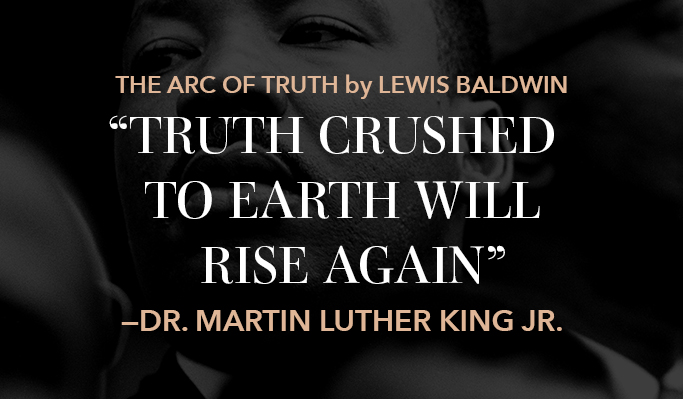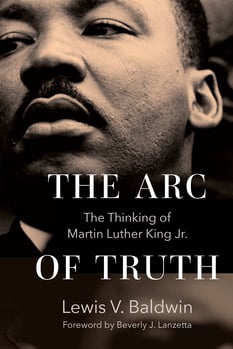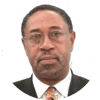
Martin Luther King Jr. said as much and perhaps more about truth than any other prominent figure in the 1950s and ’60s. This should not be surprising, since he was at once a Christian minister, the spiritual leader of a movement, and a world figure. King was not only vastly influential as an advocate for and defender of truth; he also did more than anyone in his time to organize truth into a movement for the liberation, uplift, and empowerment of humanity. His efforts ultimately resulted in the loss of his life.
King believed that it was possible to proclaim and to live truth without lapsing into dogmatic fundamentalism or antirationalism, and he tried to help others discover this as well. Despite being labeled a “notorious liar,” an “extremist,” a “law breaker,” and a “troublemaker” by racist and hate-filled detractors and opponents,1 King found a special place in that noble tradition in which major platforms are used to advance truth in both theory and practice. In other words, King’s name and image belong alongside those of Mohandas K. Gandhi, Abraham J. Heschel, Dorothy Day, Oscar Romero, Mother Teresa, Thomas Merton, Thich Nhat Hanh, and others who constitute that pantheon of great thinkers and activists. They all believed, taught, and demonstrated by example that truth derives from a revolution in the heart, mind, and soul before it can be translated into institutions and structures that guarantee freedom, justice, human dignity, equality of opportunity, and peace.
The Arc of Truth: The Thinking of Martin Luther King Jr. is quite unlike any other book that has been written and published on King up to this point. It holds that King’s life and thought must be understood largely in terms of an enduring search for and commitment to truth.2 The roots of this kind of engagement with truth gradually took form during King’s early childhood, when he displayed an amazingly inquisitive mind regarding life and the world around him, and it became quite evident toward the end of his Morehouse College years (1944–48), when the youngster “felt the urge to enter the ministry” and, more specifically, “to serve God and humanity.”3 In any case, King never separated this call to Christian service from what he described, in Gandhian terms, as “an experiment with truth.”4
This book consists of six chapters. Chapter 1 traces important developments in King’s lifelong search for truth. The significance of his upbringing in a family and church culture in which truth was considered a vital part of the spiritual quest and in which truth-telling was cherished as a supreme value is highlighted.5 Attention is also given to King’s childhood struggles with the biblical fundamentalism of southern Black Baptist Protestantism—particularly its lack of openness to critical inquiry as a path to truth—and how this drove him, while still in his teens, to “accept the liberal interpretation with relative ease.”6 King’s willingness to “fall in line with the liberal tradition” as a more promising route to truth is attributed, first and foremost, to his education at Morehouse College.7 His studies in biblical criticism, theology, philosophy, and ethics at Pennsylvania’s Crozer Theological Seminary, Boston University, and other institutions in the Northeast are considered pivotal, especially since he also found in these institutions a liberalism that encouraged not only a “devotion to the search for truth” but also an “insistence on an open and analytical mind” and a receptivity to “the best lights of reason.”8 This chapter concludes with reflections on how King’s search for truth progressed beyond his seminary and graduate school years through his involvements as a pastor, civil rights leader, and world figure. Generally, the emphasis is on a spiritual, intellectual, and practical quest that was serious, intense, and enduring.
Chapter 2 explores the answers and insights King provided as he struggled with age-old, perennial, and seemingly unanswerable questions concerning the meanings and categories of truth. While continuously influenced by a Black church and family-centered culture in which the fidelity to truth was real and unquestioned, King, as this chapter shows, approached these questions with the mind of a theologian, philosopher, and ethicist, knowing that truth is not reducible to a single definition, type, or category.9 Considerable attention is devoted to King’s thoughts on the correspondence of truth with fact and reality; on the “different though converging truths” of religion and science;10 on relative versus absolute truth; on dialectical truth; on certain basic, immutable, and objective truths in the universe; and on the ways in which attitudes toward “final,” “ultimate,” and “finished truth” discourage an openness to “new truth,”11 all of which are central to the question of definition and/or meaning. Of particular concern is King’s stress on truths derived from the lessons of experience and history, biblical truths, theological truths, anthropological truths, philosophical truths, ethical truths, “truth in the natural law,” and faith and reason as defining motifs in the advancement of truth.12 This chapter also takes into account King’s perspectives on the irreconcilability of truth and untruth, on the persevering quality of truth, and on the ultimate triumph of truth over untruth. Several conclusions can be drawn from the content provided: First, that truth, in King’s thinking, mattered and has always figured prominently in the realm of human values. Second, that King addressed the meaning of truth in both definitional and descriptive terms. Third, that King never abandoned the Hegelian idea that “truth is the whole.”13 And finally, that King’s approach to questions about the meanings and categories of truth had what might be called a distinctly “Kingian” quality,14 especially since he brought to it both his deep commitment to truth as a preacher, pastor, and social activist and his inquiring and open mind as a theologian, philosopher, and ethicist.
King’s rousing and persistent challenge to Americans to face the ugly truth about themselves, their history, and their heritage is covered in chapter 3, the content of which is framed on the basis of his sense of the dialectical or paradoxical nature of persons and society.15 The chapter opens with significant references to King’s childhood struggles in a society steeped in contradictions—a society claiming to be free while sanctioning human oppression and organized, institutionalized white supremacy. The discussion then turns to King’s lifelong challenge to a nation that claimed certain truths about humanity and freedom “to be self-evident” in its founding and most sacred documents—the Constitution and the Declaration of Independence—while simultaneously holding hundreds of thousands of Africans in an inhumane and oppressive system of bondage.16 As this chapter reveals, this coexistence of American democratic claims and the brutal oppression of Blacks and other people of color became clearer in King’s thinking during his experiences and studies at Morehouse College,17 Crozer Theological Seminary, Boston University, and other academic institutions in the Northeast18 and as he increasingly applied W. E. B. Du Bois’s “double consciousness” thesis, Georg Hegel’s analysis of the dialectical process, and Reinhold Niebuhr’s insights into the behavior of individuals and groups to the human situation in the United States.19 King’s use of the metaphors of “the ambivalent nation,” “the American dilemma,” and “the schizophrenic personality” are underscored in this chapter, for they reveal not only his significance as a dialectical thinker20 but also his emotional, intellectual, and spiritual struggle with a nation that proudly proclaimed certain profound truths “on paper” while failing to honor those truths in its daily practices.21 King emerges here as a sharp and synthetic critic of the nation’s chronic ambivalence around the questions of race, poverty and economic injustice, and war and human destruction.22 The chapter closes with references to King’s dialectical perspective on America’s founding documents of freedom; to his views on the relationship between the Declaration of Independence, the Constitution, and the Emancipation Proclamation; and to his oft-repeated pronouncements on the need for all Americans to genuinely recommit themselves to the fulfillment of the Jeffersonian idea of “self-evident truths” as a necessary step in the direction of a more perfect union.
Chapter 4 builds on the content shared in the previous chapter by focusing from a slightly different angle on King’s messaging strategy as it related to truth and truth-telling. It treats King as an ethical prophet who felt called and inspired by God to speak truth to power and evil in high places.23 King’s upbringing in a family and church tradition that affirmed, through word and deed, the critical need to witness to truth in any form and at all cost—a tradition that owed much to the Black experience and a certain reading of the ancient Hebrew prophets, the life of Jesus, and the Apostolic Church—is explored in some detail.24 King’s emergence as a church pastor and civil rights leader in Montgomery, Alabama, in the mid-1950s is seriously considered, for it was at that point that he was compelled to ask himself the question that essentially defined his role as an ethical prophet—namely, when and how to speak truth to power that is fundamentally evil and untruthful. The kitchen vision King experienced as a leader in the city’s bus boycott, during which he heard “an inner voice” saying “stand up for truth, and God will be at your side forever,”25 is treated in this chapter in terms of how it impacted King’s sense of his own prophetic leadership and the role of the prophet in general. King’s constructive critique of powerful forces such as the mass media, white supremacist organizations, political advocacy groups, government officials, the judicial system, and the Christian churches in terms of their failure to pursue truth as a regulating or guiding principle is discussed in some measure. It is noted from this point that King increasingly called “witnessing to truth,” at the risk of life and limb, “a sacrifice” or “a vocation of agony” for the prophet, likening it to cross-bearing—to acts of sacrificial love and redemptive suffering.26 Some assessment of how King himself addressed and dealt with the challenges and even the until death, is offered. The chapter ends with a discussion of King’s challenge to the people of God regarding the need to reclaim “the prophetic way”27 as an avenue to much-needed church renewal and a revitalized spiritual life.
King’s understanding and description of the civil rights movement as part of what he called “the new advancing” or “unfolding truth”28 is examined in greater detail in chapter 5. It opens with a discussion of the white South’s reaffirmation of certain aspects of its mythical past during the 1950s and ’60s and with King’s tireless efforts to refute the enduring myth that the South and North were “two different Americas” when it came to matters of race. The attention then shifts to King’s insistence on viewing the movement in historical context, and especially his tendency to regard it as yet another example of “truth marching on.”29 Of special significance are the ways in which he and his associates made truth the basis and, indeed, the guiding principle, of a creative, concerted, and protracted thrust to “redeem” and “save the soul” of the South and the nation as a whole—to entirely transform America morally, socially, politically, economically, and otherwise—thus bringing into being “a new South” and “a new America,”30 or the beloved community in both regional and national terms. The content provided affirms the Black psychologist Kenneth B. Clark’s contention that nonviolent direct action was for King “not just a strategy” but “a truth”—an “assertion of the philosophical position that one cannot differentiate means from ends.”31 The leadership role King assigned to different segments of the American population in the struggle for the beloved community ideal—or a completely integrated society and world devoid of racial oppression, economic exploitation, and wars of aggression—is acknowledged. Of particular significance was the messianic role he ascribed to “the non-myth” or “new Negro” as “a creative minority” in this human struggle.32 The final part of this chapter invites readers to imagine along with King “a new world”—a globalized beloved community in which humans take seriously and choose to live in accordance with higher human and ethical values, and especially the demands and dictates of truth.33
Chapter 6 is the concluding chapter of this book. It explores how the figure and significance of King are remembered, viewed, and appropriated in America in what some cultural and social critics variously call “the post-truth age,” “the new age of lies,” “the post-truth era,” “the post-fact society,” or “the post-truth world.” The twenty-first-century reality of “alternative facts,” “the crisis of truth,” “deliberate deception,” “fake news,” “fictionalized propaganda,” “half-truths,” “conspiracy theories,” “disinformation campaigns,” and “the war on truth”34—a reality in which the lines between truth and untruth are too often unclear and indistinct—is taken seriously, particularly in light of its impact on how King is understood, on how his legacy is evaluated and appropriated, and on how certain elements within the ranks of the political and religious right assess their own obligation in terms of advancing the unfinished agenda of his sacred crusade. The presidency of Donald J. Trump and Trumpism, which escalated “the war on truth” to new and unprecedented levels, is discussed as a formidable challenge to both the Kingian model of ethical leadership and the King legacy as a whole. The essential point is that Trump and Trumpism epitomize what it means to live and function in a post-truth culture—a culture that fails to demand an unwavering devotion to those moral and/or ethical values and norms that King considered vastly important for those who assume the mantle of leadership in the quest for a more just, humane, and inclusive society and world. Finally, an assessment of the relevance and implications of King’s ideas and activities for a society and culture in which a relentless assault on truth has become the new normal, even with the blessing of all too many political and religious leaders, is provided. The conclusion is that because King always advocated, cherished, and practiced objective truth-telling and the coherence of words and deeds as a part of a larger culture of basic moral and ethical standards, he provides some of the answers about how to rescue and reclaim truth in this social media world.
The significance of The Arc of Truth: The Thinking of Martin Luther King Jr. rests on essentially three levels. First, it contributes to the sustained conversation concerning the role of ideas in King’s life. Second, it shows that King’s significance for humanity cannot be limited to his contributions as a preacher, pastor, civil rights leader, and world figure—that he was and remains equally impactful as a theologian, philosopher, and ethicist. Finally, this book reveals that there is a certain timelessness about so much of what King believed, said, and practiced with regard to truth and truth-telling. Thus, he is still meaningful for the twenty-first-century American society and world.
This is an excerpt from the introduction of The Arc of Truth: The Thinking of Martin Luther King Jr.



